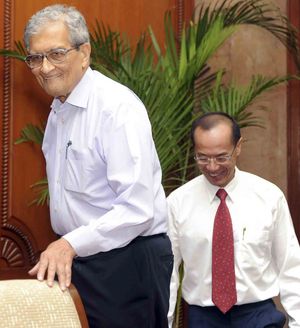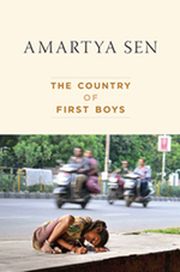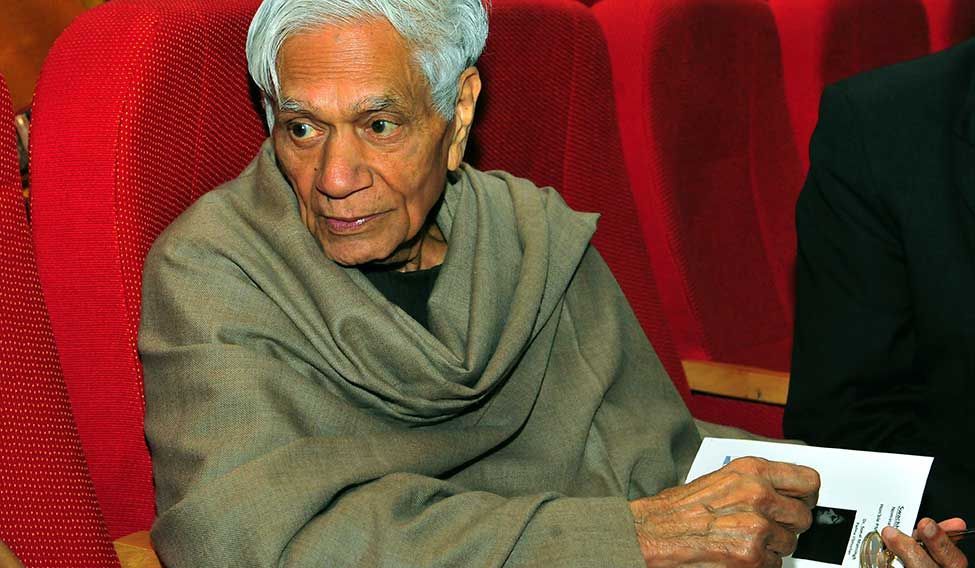Relations have been troubled between the newly elected Government of India and the Governing Board of Nalanda University (including myself as chancellor)…. The new Prime Minister, Narendra Modi of the Bharatiya Janata Party, who has long been an active member of the ideological fountainhead of the Hindutva movement, the Rashtriya Swayamsevak Sangh, is a more polarising figure than were the previous BJP leaders, such as Atal Bihari Vajpayee.
Given that, and also in view of the fact that I have freely spoken about my scepticism of Mr Modi’s qualifications to lead a secular country, I was not entirely surprised to encounter governmental hostility to my continuing as chancellor of Nalanda University, coming from the Modi government. If there was a personal element in the hostility (even though I have had good personal relations with many other BJP leaders), the bigger issue was that of the academic independence of Nalanda University, rather than its having to be in conformity with the political priorities of the ruling party.
The unanimous recommendation of Nalanda’s Governing Board, arrived at in my absence, in a meeting last January chaired by George Yeo of Singapore, that I should continue as chancellor, did not receive the endorsement of the visitor—the President of India—who has to act on the advice of the government. In fact, the Minister for External Affairs made it clear to board members who spoke with her that I was no longer acceptable as chancellor, and that the board must think of other names.
The governmental nonacceptance of the decision of Nalanda’s Governing Board led to a much-discussed tension between the board and the government. While I appreciated—and was moved by—the unanimous support I received from the board, it soon became clear to me that the conflict between the government and the Governing Board of Nalanda on the subject of my continuing as chancellor was proving to be a barrier to the urgent work of rebuilding Nalanda.
 Sen with George Yeo, the new chancellor of Nalanda University | AFP
Sen with George Yeo, the new chancellor of Nalanda University | AFP
It also became obvious to me that even if I were able to continue as chancellor (in line with the Governing Board’s decision), governmental intervention would make me an ineffective leader for reestablishing Nalanda, and this surely could not be in the interest of the new university. So I decided to remove myself from being considered for reappointment when my present term comes to an end in mid-July this year.
The interventions in Nalanda fit into a general pattern of interference by the present government in academic leadership across the country. For example, in January this year, when Sandip Trivedi, a renowned physicist, became the director of the Tata Institute of Fundamental Research, perhaps the most prestigious scientific institution in India, chosen by a duly constituted selection committee chaired by one of India’s most well-known scientists, C.N.R. Rao, the Institute was told by the Prime Minister’s Office that Trivedi must be removed from his post. In January, Raghunath Shevgaonkar, director of the Indian Institute of Technology Delhi, resigned from his position, alleging governmental interference in IIT’s decisions. In March, Anil Kakodkar, one of India’s leading nuclear scientists, resigned from the chairmanship of the Governing Board of the Indian Institute of Technology Bombay, in protest of meddling by the government. Again, in late February, the government asked the writer A. Sethumadhavan to leave his position as chairman of the National Book Trust (set up decades ago as ‘an autonomous body under the Ministry of Education’), so that this influential position could be given to a Hindutva ideologue, Baldev Sharma....
This is, of course, not the first time that the government has interfered in academic matters. The previous UPA government’s record in non-interference was far from impeccable. But the extent of intervention has become extraordinarily common—and often politically extreme—under the present regime.
Often enough, the persons chosen for heading institutions of national importance have been exceptionally dedicated to promoting Hindutva priorities. For example, the newly appointed head of the Indian Council of Historical Research, Yellapragada Sudershan Rao, may not be known for research in history, but his Hindutva-oriented opinions are well-known. For example, in his paper ‘Indian Caste System: A Reappraisal’, Rao gives his endorsement to the caste system, which—we are told—is often “misrepresented as an exploitative system”.
Rao’s strong links with Akhil Bharatiya Itihas Sankalan Yojana (ABISY), which is known as the ‘history wing’ of the RSS, have been a matter of concern in the academic community, especially after four ABISY activists were appointed to the council of the ICHR. The chief editor of the official journal of ICHR (Indian Historical Review), the noted historian Sabyasachi Bhattacharya, resigned rather than having to work with the transformed ICHR.
Similarly, the new head of the Indian Council of Cultural Relations (ICCR), Lokesh Chandra, appointed by the Modi government, has informed The Indian Express that “from a practical point of view [Mr Modi] supersedes Mahatma [Gandhi]”. Chandra has shared his view that Modi is, in fact, “a reincarnation of God”.
Given all this, Nalanda University has reason to be cautiously hopeful that there is a possible compromise that seems to be emerging—with the strong likelihood, at the time of writing this essay, of having an East Asian chancellor, in particular George Yeo, who has been a major architect in the reestablishing of Nalanda. This is not, however, accidental good fortune…. The debates surrounding the confrontation between the government and the Governing Board received a lot of media coverage and extensive public scrutiny, and these developments have certainly helped to have a restraining effect on the government, unlike in the case of many other academic institutions. It has also helped the Minister for External Affairs, Sushma Swaraj, in her resolve to have a solution that would be publicly defendable—rather than follow the unilateral extremism characterising many of the academic interventions by the Modi government.
Published with the permission of Oxford University Press and The Little Magazine. The Country of First Boys: And Other Essays will be out in August.

The Country of First Boys: And Other Essays
By Amartya Sen
Published by Oxford University Press
Pages 328; price Rs550





